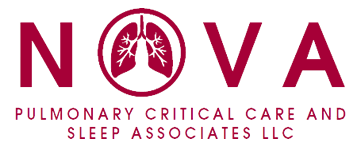Best Doctors for Sleep Disorders Arlington, VA
Sleep disorders impacts overall health
Sleep disorder is a condition that interferes with your natural sleep cycle. Sleep needs for each individual are different, however the National Sleep Foundation recommends that adults get about 7 to 9 hours of sleep each night.
Are you suffering from a sleep disorder?
If you are having difficulty falling sleeping or suffer from insomnia then it is important to diagnose and treat your sleep disorder. When you fall asleep your body and brain are performing a variety of vital functions that help you live and function optimally. Therefore, if you don’t get enough sleep, it’s not just about feeling tired. It affects your body and mind, thinking and day-to-day activities.
Sleep disorders can affect more than just your day-to-day sleepiness. You may suffer from poor concentration, memory loss, and problem-solving abilities. Our experienced doctors and staff at NOVA Pulmonary Critical Care and Sleep Associates, can diagnose and treat your sleeping issues. We have the knowledge and experience to assess, diagnose and treat your sleep-related issues and help you get back on track.
Should I worry if I have a sleep disorder?
Do you suffer from tiredness or are constantly sleepy? Do you snore a lot? More than 90% of Americans say they have trouble sleeping, but many don’t get the help they need because they don’t know they need it. If left untreated, sleep problems can lead to heart disease, stroke, hypertension, depression, diabetes and chronic daytime sleepiness that disrupts day-to-day activities.
If you think you have a sleep problem, speak to your primary care doctor and request a referral to your Sleep Disorders Center.
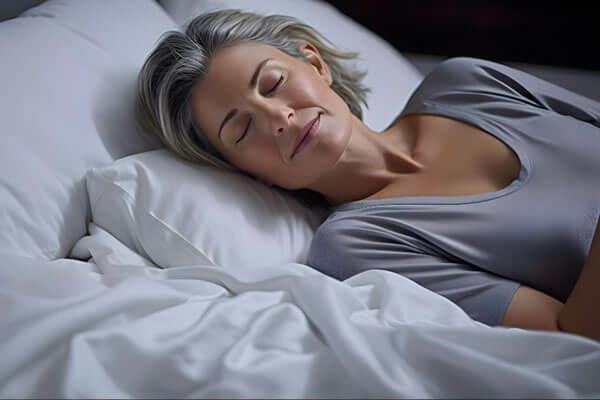
Common Symptoms of Sleep Disorders Arlington, VA
Sleep Specialists at NOVA Pulmonary Critical Care and Sleep Associates are among the best in the country. You can rest easy knowing that you have been treated by one of the best. Our compassionate staff, cutting-edge treatments, top-of-the-line technology, and conveniently located locations in the proximity of Arlington, Virginia make NOVA pulmonary Critical Care and sleep associates one of the top treatment options in the country.
- Difficulty sleeping
- Sleep-time anxiety
- Waking up feeling tired
- Daytime fatigue
- Daytime sleepiness
- Low energy
- Heart problems
- High blood pressure
- Difficulty concentrating
- Irritability
- Mood swings
- Memory problems and other cognitive difficulties
- Weight gain
- Premature aging of the skin
- Reflux (heartburn)
- Snoring
- Frequent accidents
- Jittery legs
- Mild to severe depression
- Personality changes
- Decreased sexual desire
- Nightmares
- Sleepwalking
- Sleep time anxiety
- Bed wetting
- Kidney failure
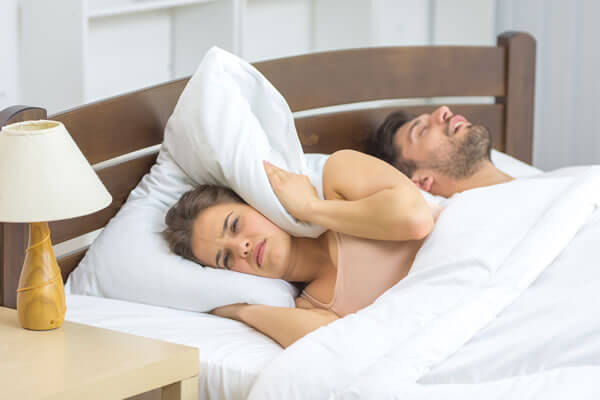

Conditions of Sleep Disorders Arlington, VA
Sleep medicine experts can help you figure out what’s wrong with your sleep and how to treat it. They can diagnose and treat a variety of sleep issues, like:
- Bruxism (teeth grinding)
- Central sleep apnea
- Sleep apnea, including obstructive sleep apnea (OSA)
- Circadian sleep disorders and disturbances
- Sleep disorders
- Sleep disorders in special populations, including pediatric and cancer patients
- Sleep terrors (“night terrors”)
- Insomnia
- Hypersomnia
- Narcolepsy
- Nightmare disorder
- Nighttime leg cramps
- Parasomnias
- REM (rapid eye movement) sleep behavior disorder
- Restless legs syndrome
- Sleepwalking (somnambulism)
- Snoring and snoring disorders
Diagnosing and Treating Sleep Disorders Arlington, VA
NOVA Pulmonary Critical Care and Sleep Associates provide sleep disorder services from diagnostic sleep studies to treatment options. Depending on the type of sleep issues their patients have, our sleep doctors suggest a range of tests and treatments, including:
Evaluation
Sleep Consultation: This is used to evaluate and get to the bottom of a patient’s sleep issues. It takes a comprehensive look at a patient’s health history and sleep habits.
Blood tests: Blood tests can be done to look for things that can mess with your sleep, like thyroid issues.
Sleep Tests:
Sleep Apnea Tests Include:
Non-invasive sleep tests are used to assess and diagnose sleep disorders. They’re done based on the type of sleep disorder you suspect. For example, if you think you have sleep apnea, they’ll observe you while you sleep in a lab overnight. If you think you have narcolepsy, they’ll watch you while you sleep and wake up for a few naps in the lab.
- Nocturnal Polysomnography – Nocturnal polysomnography (NPSG) is a comprehensive sleep study conducted overnight to evaluate and diagnose various sleep disorders. This test involves monitoring multiple physiological parameters while an individual sleeps. The purpose is to gather data on different aspects of sleep and identify any abnormalities or disruptions in the sleep cycle.
- Home Sleep Tests – these tests, while not as thorough or accurate, are less invasive and can be carried out in the comfort of your own home. They typically measure blood oxygen levels, heart rate, breathing patterns and airflow.
Sleep Log for tracking things like when you go to bed, when you wake up, and how sleepy you are during the day. It’s used to help diagnose and treat insomnia and other sleep disorders.
During sleep tests, patients are hooked up to sensors that determines on how they’re sleeping, how they’re moving around, how much oxygen they’re getting, and how they’re breathing.
Note: If you have sleep apnea, it’s important to stay away from heavy drinking and taking sleeping pills or any other drugs that can cause heavy sedation, which can make your sleep get worse. Talk to your doctor about any medications that can cause this and how to avoid them.
Treatment
Based on the outcome of your sleep apnea test(s) your sleep doctor may suggest prescription therapy or treatment. While a number of treatment options are available, one of the most commonly prescribed and effective treatments for both moderate and severe obstructive sleep apnea (OSA) is a positive airway pressure machine (CPAP machine).
Other common treatment options include a nighttime mandibular advancement device that works to move the lower jaw or tongue forward, as well as various surgical procedures.
Surgery (when required) may involve:
- Tissue removal
- Tissue shrinkage
- Jaw re-positioning
- Implants
- Nerve stimulation
- Establishing a new passageway for air
Lifestyle Changes that May Prove Effective:
- Weight loss
- Exercise
- Avoidance of alcohol, sleeping pills and tranquilizers
- Sleeping on side or abdomen vs on back
- Stopping smoking
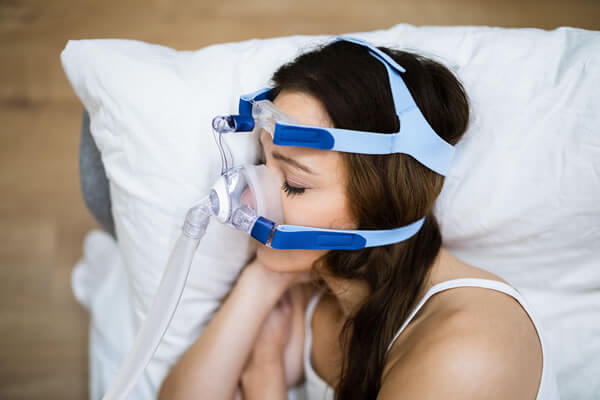
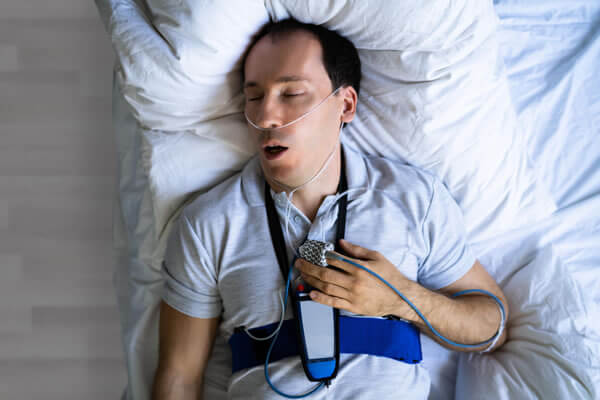
Get a Better Night’s Sleep
Getting a good night’s sleep is essential for overall health and well-being. Here are some tips to help improve your sleep:
Stick to a Sleep Schedule:
Go to bed and wake up at the same time every day, even on weekends. This helps regulate your body’s internal clock. Develop a calming pre-sleep routine to signal to your body that it’s time to wind down. This could include activities such as reading, listening to soothing music, or taking a warm bath.
Make sure your bedroom is conducive to sleep. This includes a comfortable mattress and pillows, as well as a cool, dark, and quiet environment.
The blue light emitted by phones, tablets, and computers can interfere with the production of the sleep hormone melatonin. Try to avoid screens at least an hour before bedtime.
Ensure your bedroom is comfortable and conducive to sleep. This includes a comfortable mattress and pillows, as well as controlling factors like noise and light.
Watch Your Diet:
Avoid heavy meals, caffeine, and alcohol close to bedtime. These can disrupt sleep patterns and affect the quality of your sleep.
Get Regular Exercise:
Regular physical activity can contribute to better sleep. However, try not to exercise too close to bedtime, as it may have the opposite effect.
Manage Stress:
Practice stress-reducing techniques such as deep breathing, meditation, or yoga. These activities can help calm your mind and prepare your body for sleep.
Limit Naps:
While short naps can be beneficial, long or irregular napping during the day can interfere with nighttime sleep. If you need to nap, try to keep it under 30 minutes and avoid napping late in the day.
Seek Professional Help if Needed:
If you consistently struggle with sleep, consider consulting a healthcare professional. They can help identify any underlying issues and provide guidance on improving your sleep.
Remember that everyone’s sleep needs are different, so it’s important to find what works best for you. If sleep difficulties persist, consider consulting a healthcare professional for personalized advice.
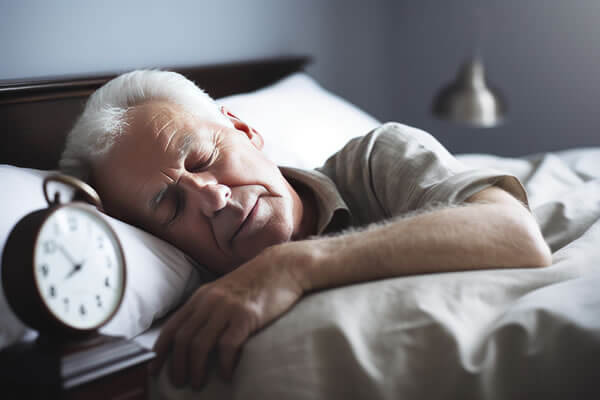

Book an Appointment To Get Treated at Our Clinic
At NOVA Pulmonary Critical Care and Sleep Associates, we put our patients first. Our team of talented medical professionals is dedicated to providing the best care and treatment options in the area. If you or a loved one have concerns about issues caused by lack of sleep, give us a call today. Our friendly team is standing by and ready to learn how we can help.
What Our Patients Say About Us
“Dr. Dubey has been a tremendous find for me. We relocated from Texas and I was in desperate need of a Pulmonary Specialist. He wasted no time in getting me tested, X-rays, and then on a prescription, as he diagnosed me with Asthmatic Allergens. I was elated that someone could clinch the problem and administer diagnostic care that other physicians struggled to do over the past 5 years. He is a doctor who is very proactive and his staff is delightful and personable. I highly recommend Dr. Dubey!”
We have received really great care from Dr. Dubey and his team for almost a year now. My dad’s health issues are complicated, and Dr. Dubey has really helped us achieve a better quality of life for him. He is refreshingly knowledgeable, patient, thorough, and efficient. All of the office staff is also incredibly helpful and friendly. I am so happy that we landed here and highly recommend choosing this medical group. “
Nova Pulmonary Critical Care and Sleep Associates
Office Location: 19420 Golf Vista Plaza suite 230b, Lansdowne, VA 20176
Hours of Operation: Monday – Friday 9 am to 5 pm
Driving Directions from Arlington to Our Lansdowne Office:
Get on I-66 W from Fairfax Dr
Take VA-267 W and VA-28 N to VA-7 W in Loudoun County.
Take the VA-7 W exit from VA-28 N
Continue on VA-7 W to your destination
Meet the team at NOVA Pulmonary Critical Care and Sleep Associates
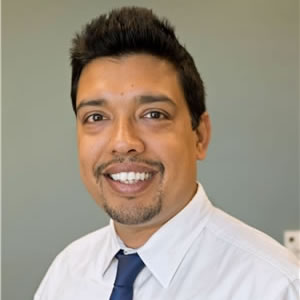
Dr. Aditya N Dubey, M.D, F.C.C.P. – Founder
Specialty:
Pulmonary, Critical Care and Sleep Medicine
Board Certified by American Board of Internal Medicine in the Subspecialities of Pulmonary Medicine, Critical Care Medicine and Sleep Medicine. Learn more about Dr. Dubey
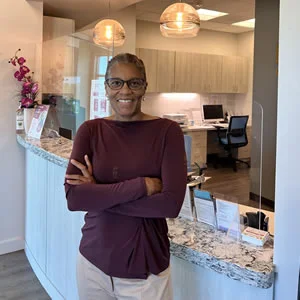
Dr. Petra Thomas, M.D.
Specialty:
Pulmonary Medicine
Board Certified by American Board of Internal Medicine in the Subspecialities of Pulmonary Medicine. Learn more about Dr. Thomas
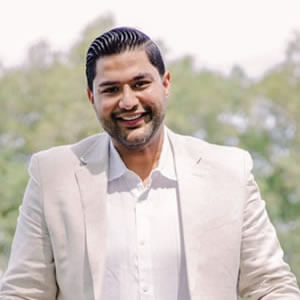
Dr. Arman Murabia, M.D.
Specialty:
Pulmonary, Critical Care and Sleep Medicine
Board Certified by American Board of Internal Medicine in the Subspecialities of Pulmonary Medicine, Critical Care Medicine and Sleep Medicine. Learn more about Dr. Murabia

Rebekah Lee, AGNP-C
Nurse Practitioner. Learn more about Rebekah Lee

Christine Amorosi, AGNP-C
Nurse Practitioner. Learn more about Christine Amorosie
Office Locations
Conveniently located near you in Loudoun and Fairfax VA
NOVA Pulmonary – Dulles
24430 Stone Springs Boulevard
Suite 200
Dulles, VA 20166
NOVA Pulmonary – Lansdowne
19415 Deerfield Avenue
Suite 301
Landsdowne, VA 20176
